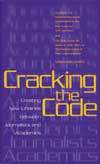Cracking the Code
Creating New Lifelines between Journalists and Academics

Highlights of a brainstorming session co-sponsored by the Pew Center for Civic Journalism and The Reilly Center for Media & Public Affairs at The Manship School of Mass Communication.
Louisiana State University
September, 2000
Baton Rouge, LA
Table of Contents
Introductions >>>
John Maxwell Hamilton, Dean, Manship School of Mass Communication
Jan Schaffer, Director, Pew Center for Civic Journalism
Key Research Questions >>>
Key Recommemdations
Key Research Questions: What research questions would help journalists produce news that’s more relevant to their communities? How can the academy produce research that journalists need and will use? Editors and educators share what they’d like to know.
Successful Academic-Newsroom Partnerships >>>
Participants recounted their experiences with newsroom-academic partnerships that changed newsroom practices and improved research methods. Successful ventures included crime reporting models and content audits.
A Call for Change >>>
Journalists say the academy is out of touch with the industry’s needs. Academics say there are no rewards for relevant research. Both want to pair the intellectual muscle of universities with practical problems of the industry.
A Vision for the Future >>>
Brainstorming produced a collection of ideas, both practical and cosmic, for improving newsroom research partnerships. A consistent call for a clearinghouse to coordinate efforts prevailed.
Conclusion
Participants
- Nancy Conner, Former Reader Advocate, St. Paul Pioneer Press, Director of Publications and Media Relations, Minnesota State Colleges & Universities
- Everette E. Dennis, Felix E. Larkin Professor of Communication & Media Management and Director of the Center for Communication, Fordham University Graduate School of Business, NY
- Gene Foreman, Foster Professor, Penn State University, Former Managing Editor, The Philadelphia Inquirer
- John Maxwell Hamilton, Dean and Braezeale Professor of Journalism, Manship School of Mass Communication, Louisiana State University
- Ralph Izard, Associate Dean for Graduate Studies and Research, Manship School of Mass Communication, Louisiana State University, Professor Emeritus, E.W. Scripps School of Journalism, Ohio University
- Alex S. Jones, Director, Shorenstein Center, John F. Kennedy School of Government, Harvard University
- David Kurpius, Assistant Professor, Manship School of Mass Communication, Louisiana State University
- Pam Luecke, Former Editor, Lexington Herald-Leader, Donald W. Reynolds Professor of Business Journalism, Washington and Lee University
- Phil Meyer, Knight Chair and Professor of Journalism, University of North Carolina-Chapel Hill
- Arlene Morgan, Former Readership Editor, The Philadelphia Inquirer, Director of Professional Development, Columbia University Graduate School of Journalism
- Chris Peck, Editor, The Spokesman-Review, Spokane, WA, President, Associated Press Managing Editors
- Jan Schaffer, Executive Director, Pew Center for Civic Journalism, Washington, DC
- Kathy Spurlock, Executive Editor, The News-Star, Monroe, LA
- Esther Thorson, Associate Dean for Graduate Studies, Missouri School of Journalism, University of Missouri-Columbia
- Dorothy Wilson, Managing Editor, The Sun Herald, Gulfport, MS
- J.J. Yore, Executive Producer, Marketplace, Los Angeles
- Walter W. Dean, Former Associate Director, Pew Center for Civic Journalism, Consultant, News Lab/Project for Excellence in Journalism
